Stay in the know on all smart updates of your favorite topics.
People get more connected and technology becomes part of our daily life. Between 2014 and 2015 there was a 27% growth of internet traffic in Amsterdam. Eleven out of fifteen Trans-Atlantic data cables are connected with or go through Amsterdam and the AMS-IX is the second largest internet exchange point in the world. In 2016 Amsterdam was ranked second in the European Digital City Index. Do you work on a smarter city? Share your technologies here!
The Supportclub

Our idea: The Supportclub, let’s look after someone, as a team
The Supportclub makes volunteering for another person fun and easy to do. Our app carefully designs teams around a person in need, based on skills and fields of interests. Our network partners invites people that need a little help or company, informal care to make a profile as a supportee. Our campaign recruits people that want to help somebody, the supporters. They also make a profile.
The Supportclub app matches supporters based on their interests and skills. The app creates (temporary) teams around a supportee, e.g. Annie → Support team Annie. The Supportclub facilitates the teams to work together for Annie providing handy features like notification, a calendar, chat and monthly meet-up for the team.
The Supportclub proposition for supporters:
- look after a person that needs some help (18+)
- in a carefully designed team
- for a fixed period of time
- with social team activities
- facilitated by an app
Join the Supportclub!
The Support club proposition for supportees:
- Do you need some help or company?
- Register yourself at The Support Club and get a team. Three to five people that are willing to look after you. They do it together and make new friends while doing it.
- You let us know what your needs are and we do the rest.
Join the Supportclub!
Smart City Haarlemmermeer - Digital Society School project
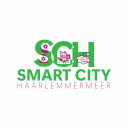
In large and diverse public organizations like the Gemeente Haarlemmermeer, communication can sometimes be hindered by silos. Different departments or teams in the organization may work independently leading to a lack of information sharing and coordination. With so many channels and platforms available, it can be difficult to filter out the information that is relevant and important to employees. This can lead to information overload and make it difficult for employees to stay updated on important updates.
Thus, the trainee team from the Digital Transformation Traineeship Programme at Digital Society School embarked on a challenge on how Gemeente Haarlemmermeer can be facilitated to become a smarter, more connected, transparent and digitally inclusive organisation.
Read more about the project on the website of Digital Society School!
Pientere Tuinen

Pientere Tuinen is een 3-jarig project dat begin april 2023 is gestart. Tot eind 2023 kunnen nieuwe deelnemers aansluiten bij het grootste participatieproject in Nederland. Pientere Tuinen is een samenwerking van 7 publieke en private partijen.
De aanpak in Pientere Tuinen draait om drie samenhangende onderdelen.
1. Data verzamelen met een slimme sensor en een interactief/educatief dashboard van de eigen tuin voor de individuele inwoner,
2. Kwantitatief (data-analyse) en kwalitatief (interviews/surveys) onderzoek naar strategieën voor een gezonde leefomgeving en duurzame gedragsverandering,
3. Advies op maat aan bewoners over de inrichting en het beheer van de tuin
Het doel van Pientere Tuinen is een groenere, gezondere leefomgeving te creëren door het bewustzijn en de motivatie bij tuinbezitters te vergroten. Dat doen we door data te verzamelen, onderzoek uit te voeren en meer maatwerk te bieden in de advisering en voorlichting aan bewoners.
Enkele voordelen van uw deelname aan Pientere Tuinen op een rijtje
- Tuinbezitters krijgen een bodemsensor die drie jaar lang hitte, bodemkwaliteit en het vochtgehalte meet, waarvan resultaten zichtbaar zijn op een dashboard
- Tuinbezitters krijgen (mede op basis van de data) specifieke voorlichting voor het vergroenen van de tuin door middel van tuintips, stappenplan en mogelijke (wijk)workshops
- Deelnemende organisaties zijn onderdeel van het grootste participatieproject van Nederland met ca. 5.000 deelnemers en meetpunten door heel Nederland
- Deelnemende organisaties worden betrokken bij twee langdurige, landelijke onderzoeksprogramma’s naar motivatie voor vergroening en gedragseffecten van verschillende interventiestrategieën, en data-analyses van milieu- en gezondheidsaspecten
- Als organisatie bent je zelf als partner zichtbaar in een landelijke PR- en communicatiecampagne rondom het project.
- Je leert zelf binnen de community over structurele, duurzame vergroening met uw inwoners onder andere van de onderzoeksprogramma’s en andere projectpartners
BewustwordingsModel Smart City

Hoe slim is de ideale leefomgeving wat jou betreft, nu en in de toekomst? Wat betekent dat voor o.a. je strategie, diensten en technologie?
Vanuit phbm voegen we graag een gereedschap toe aan jouw Toolbox voor Smart City-vraagstukken. Eén waarbij we het voorstellings- en inlevingsvermogen activeren en welzijn centraal staat: het BewustwordingsModel. Dit model maakt de positie en wensen van jou en de ander expliciet en voorkomt dat er ruis ontstaat over het niveau van ‘slimheid’ in de leefomgeving. Door de toelichting van de passende organisatie, samenwerking, strategie e.d. bij de niveaus ontstaat een scherp beeld van wat het gekozen niveau betekent voor het individu, de organisatie of zelfs de samenleving als geheel. Eén van de centrale vragen bij het model is: hoe ‘smart’ wil je zijn en waar zit de optimale balans tussen mens en technologie?
Eerste gepubliceerde versie is tot stand gekomen samen met partners in de City Deal (‘Een slimme stad, zo doe je dat’). Het laat op vijf niveaus zien in welke mate een organisatie of bedrijf slim is. Eén van de doelen hiervan is om te bepalen of opdrachtgever en opdrachtnemer dezelfde taal spreken. Vanuit phbm zijn we doorgegaan op het model en hebben onder andere ethiek en mobiliteit als pijlers toegevoegd.
Het model is openbaar inzichtelijk, phbm begeleidt graag in het proces om samenwerkingspartners gezamenlijk bewuster te maken op welk niveau ze staan (gebruikmakend van het model) en met welke ontwikkelingen je rekening kan houden in het vraagstuk wat op tafel ligt (op vlak van organisatie, diensten of ethiek bijvoorbeeld).
Open Call: Create impact with the European CommuniCity project!

Does your organisation work with vulnerable target groups in Amsterdam, or are you a tech company with great ideas for digital solutions for this group? Create tech applications together for the challenges of vulnerable communities during the European CommuniCity project.
From 28 February to 31 March, you can submit your proposal for one of the challenges to CommuniCity for a chance to win a €12,500 grant to test your idea in practice.
How does it work?
- Companies or organisations submit their proposal via the CommuniCity website;
- The submissions are assessed against the set criteria and thus the winners are selected;
- The winning entries receive a grant of 12,500 euros to develop and test their solution together with the target group in Amsterdam.
For more information about the project, the challenges for Amsterdam and application conditions check the website below!
Research Interview on Digitalization and Big Data in City Administrations
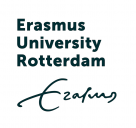
My name is Joe Calodich and I work as a researcher at Erasmus University Rotterdam in the research group Vital Cities and Citizens. I am currently looking for members of the city administrations in Amsterdam, Rotterdam, Prague, Tallinn, Vienna, Zurich, Brussels, or Munich who are interested in participating in a research interview.
The study which I am asking your participation for focuses on how large European cities have undertaken the digitalisation process of the public administration and how this process has affected the workings and the policies. I would also like to learn about some concrete examples on the use of big data related to this digitalisation process.
I hope to complete the interviews by the end of February 2023. Each interview will last between one hour and fifteen minutes and one hour and a half. The interview will be recorded and the content will be exclusively used for academic purposes (analysis, scientific publications, presentations, reports) and within the boundaries of the study’s goals. The gathered information will be treated by complying with anonymity and confidentiality criteria as defined in the social sciences regarding the use of personal information.
If you, or a colleague, is interested in participating, please send me an email at: 627583jc@eur.nl.
I look forward to hearing from some of you soon!
Responsible digitalisation challenge: How to make digital systems more human-centric?
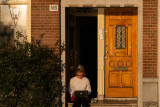
Technological and innovative developments are moving faster than ever before. As a government, you want and need to keep up with these developments. At the same time, the use of digitalisation and data often leads to undesired results, increasing the distance between citizens/entrepreneurs and the government.
The municipality of Haarlemmermeer is shifting her focus from 'the system is central, people have to become more digitally savvy to 'people are central, our systems have to become human-centric’. The underlying question is: how do you really put people at the centre of digitalisation and the design of digital systems?
Do you want to know more or contribute to this challenge? Contact me via sophie@amsterdamsmartcity.com or let me know via the comments below.
Project’s current phase
Jeroen Brink and Christine Groothuis from the municipality of Haarlemmermeer introduced this challenge to the Amsterdam Smart City network on the 7th of November, 2022. During a co-creation session, we discussed that there are two main elements of this complex challenge that we would like to focus on. On the one hand, we’re talking about a radical and fundamental shift. A different way of thinking within governmental institutions. This shift requires a more philosophical and substantive conversation about how we would like our digital public space and systems to look like. But on the other hand, we want to think big but also start small. Therefore, the municipality of Haarlemmermeer would like to embrace a real-life case to bring human-centred digital systems to life.
On the 1st of December, we organised a follow-up session with Amsterdam Smart City partners. During this session, Max Kortlander (Waag) presented the Public Stack. This project puts the public value at the centre to create open, democratic and sustainable digital public spaces. Following this introduction, we did a futures-thinking exercise led by Sacha van Tongeren (Kennisland), to think about how we want the digital public space to look like in the future. And additionally, we used empathy maps to synthesize our collective knowledge about our audience, which brought us closer to a common understanding of who they are.
Responsible smart doorbells

Photo: Daan Rozinga, The Incredible Machine
The Responsible Sensing Lab is currently working on a few projects regarding smart doorbells.
Smart doorbells are like a security camera's, but available for everyone. Always on, and owned by private parties, the smart doorbell is destined to have an impact on our privacy. As of now, there could be thousands of smart doorbells in Amsterdam, filming public space. We don t have a clear view on the numbers, and we do not know what the owners do with the collected data. Smart doorbell owners are often not aware of the privacy issues.
One of the Responsible Sensing Lab's projects is Shutterring. The Shutterring project aims to make smart doorbells more responsible by ensuring the privacy of bypassers and owners while keeping the main functionality of the device intact. Shutterring is a design by The Incredible Machine.
Inspired by Shutterring, the Lab has started another project regarding responsible smart doorbells: Challenging the design of smart doorbells. In order to challenge the current design of smart doorbells (IoT doorbells with integrated cameras) a few alternative smart doorbells have been created through speculative design. The goal of this project is to kickstart a conversation about how to deal with the presence of smart doorbells in the city of Amsterdam. How could smart doorbells be designed in a way that they align better with the values of the city and its population?
The Responsible Sensing Lab team will present both their smart doorbell projects during the demo day on 11 October. Stay tuned!
Building a shared vision of the city - with LEGO!
Building the largest interactive LEGO model of the future city ever!
Imagine a model of the city; however, instead of a literal representation, this is a sculpture that holds ideas and dreams from citizens, policymakers, entrepreneurs and visitors about what the city might be like after we solve major transitional challenges (e.g. sustainability, energy, equality, smart).
What would it feel like to be in this city? What do people wish this future city to become?
the goal
A model of the city that contains the ideas that a diverse group of people have about how the city might emerge from major transitional change like climate adaptation, sustainability, equality, smart. Imagine the city from what might be and what opportunity change offers.
the form
A room-sized model built with LEGO in a public space and with interactivity (e.g. app / QR link / AR) to share the stories that this model contains.
the process
Lego is an powerful way to evoke and capture stories about how people think about something. Through a series of workshops, people from all parts of the city will be invited to share how they think about the future of the city and capture their stories in a collective model. An interactive installation opens up those stories to passers-by and other participants.
partners
finance, organisational, tech
call to action
Get in touch if you want to contribute to the realisation of the largest LEGO city vision model ever!
Management Laboratory: Creation of New Businesses.

Hello entrepreneurs.
I am looking for partners to generate brainstorm. And create a global new business project.
Interested to know more, send an email to
motivaco@gmail.com
Simple Sensors for responsible sensing

City officials require sensor data to optimize operations, plan projects, or measure effects of interventions. Citizens often do not notice the sensors deployed by the City in public space. Also, the benefit for the public is not directly obvious to city residents or immediately shown by the sensing systems in place. Namely, in many cases only after data is processed, it informs an action that affects citizens.
Public concerns about sensors are often connected to concerns about potential action (to be taken by, for example, city officials), and that the action has negative implications. With ‘Simple Sensors’ we address these concerns.
The Simple Sensors project, which is part of the Responsible Sensing Lab, investigates these questions: What if sensors are designed to be seen? What if they communicate clearly what data they collect and how? And what if sensors invite you to interact with them?
Modules for responsible and ‘simple sensing’
Simple Sensors consists of a family of modules, designed by The Incredible Machine, that can be combined: some modules improve transparency over what data is being collected, other modules encourage interaction, and some modules just make it understandable how sensors work. The Simple Sensors family allows the City of Amsterdam to design sensors to fit any context or purpose.
A privacy friendly alternative for CCTV
The first Simple Sensor prototype called millimeter wave (mmWave) has been developed as a proposal for the City’s crowd management sensor at the Marineterrein Amsterdam Living Lab. It consists of four modules: 1) sensor module 2) transmission module, 3) data module, 4) threshold module... Continue reading about the project on our website >>
Shuttercams for a responsible smart city

Shuttercam is a project by Responsible Sensing Lab (RSL), a collaboration between the City of Amsterdam and AMS Institute. In essence, RSL is a testbed for conducting research and experiments on how smart sensing technologies in public space – like cameras – can be designed in a way that makes the digital city 'responsible’.
At the Lab we invite academics and practitioners responsible for digital systems in the city to explore how to integrate social values such as autonomy, privacy and transparency in the design of these sensing systems in public space.
How to know when a camera ‘sees’ you?
The Shuttercam project originated based on the notion that citizens currently can not directly know or see if and when cameras in public space are monitoring you or not. The project also questions the necessity for many non-security related cameras in the city to be switched on indefinitely.
Experimenting with 3 prototypes at Marineterrein
The Shuttercam project will test 3 prototypes. These are installed at Marineterrein Amsterdam Living Lab (MALL) in the upcoming weeks.
First and foremost, the cameras within this project are all part of the crowd monitoring system by the City of Amsterdam, which is a privacy friendly system. So what do these cameras record or see for example?
A crowd monitoring system works with a camera that has an algorithm read out and analyzes video images. In addition to measuring crowds and displaying those crowds in usable numbers, the algorithm can also determine whether people keep a distance of 1.5 meters. All this is done in an anonymous manner that naturally complies with all privacy legislation.
The video images are not watched by a human but are processed automatically. Only a few frames are saved with unrecognizable, blurred people's faces. Those frames help to "train" the algorithm. Furthermore, the images are not saved. Continue reading about the the Shuttercam project >>
The 100 Intelligent Cities Challenge

The 100 Intelligent Cities Challenge (ICC) is a European Commission initiative that supports 136 cities in using cutting-edge technologies to lead the intelligent, green and socially responsible recovery. The ICC cities and their local ecosystems will be engines for the recovery of their local economy, create new jobs, and strengthen citizen participation and wellbeing.
The ICC is part of a wider EU support system that recognises the importance of delivering on the promises made by the European Green Deal, the digital strategy, and other EU policies. It looks to move towards a more digital, service-oriented and low-carbon economy, supported by a knowledge-based society, that enables circular economy systems through ‘local value loops’, evidence-based reskilling, and sustainable investments.
Participating cities receive one-to-one strategic advice from international experts on fine thematic strands: green economy and local green deals, improving the citizen participation and the digitalisation of public administration, green and digital transition in tourism, resilience of local supply chains, up- and reskilling of the workforce. ICC Cities are also supported by transversal services on access to data, access to finance and through a marketplace full of innovative solutions.
The Amsterdam Region, represented by Amsterdam Economic Board and Amsterdam Smart City (ASC) is one of the ICC mentor regions, alongside European mentor cities Aarhus, Antwerp, Barcelona, Espoo, Hamburg, Nice, Porto, Rijeka and international mentors Medellin, Singapore and Toronto. By participating in the ICC, the Amsterdam Region will share its experience and learn from other best practices related to multi-stakeholder collaboration, innovation ecosystems, circular economy and citizen participation.
ICC Updates:
• Launch of 100 Intelligent Cities Challenge
• ICC Challenge Mayors’ Summit
• Launch of ICC Renovation Action Group
• Public Kick-off 2nd ICC City Lab
• ICC - 3rd City Lab
• 200 Intelligent & Climate Neutral Cities Jam
• ICC - 4th City Lab
• Invitation to co-create European transition pathways for more resilient, greener and digital industrial ecosystems
• ICC - 5th City Lab
• Developing circular and sharing economy practices in cities
• The 100 Intelligent Cities Challenge: Looking Back & Looking Forward (End of Phase 1)
Responsible Sensing Lab

Smart city systems can help solve urban challenges. But when collecting data, what public values are involved? The Responsible Sensing Lab explores how to integrate social values such as autonomy, privacy, transparency, inclusiveness and empowerment in the design of sensing systems in public space.
In January 2021 the Responsible Sensing Lab was officially launched during an interactive livestream event. In essence the Lab is a testbed for conducting rigorous, transparent, and replicable research on how our smart technologies placed in public space can be designed in a way that makes the smart city ‘responsible’. Responsible Sensing Lab is a collaboration between the City of Amsterdam and AMS Institute.
A lab for a ‘responsible’ smart city
The City of Amsterdam has many smart technologies in place: from smart devices that measure things (i.e. sensors) to smart devices that steer processes in the city (i.e. actuators) such as traffic lights, charging stations, adaptable street lights, barriers that go up and down, and adaptive digital signs.
At the Responsible Sensing Lab we research, develop and integrate smart technologies like the aforementioned to help solve urban challenges. At the same time, we explore how to embed society’s public and democratic values in the design of these innovations.
(Re)designing, prototype testing and implementing responsible sensing systems
Within the Lab academics are invited to connect and work with practitioners who are responsible for digital systems in the city to (re)design, prototype and test (more) responsible ways of sensing in public space.
Hence, Responsible Sensing Lab is a place where teams of multi-disciplinary stakeholders – such as computer scientists, policy makers, psychologists, designers and hardware experts – can address existing hardware, software and other city sensing systems.
Core values
At the Responsible Sensing Lab, we use the City’s values (TADA, Digital City Agenda) as our starting point. We explore what these values mean when applied to actual software, hardware, user-experience design and governance.
Also, we are inspired by the methodology of value sensitive design. This approach allows us to focus on design choices inherent in the type of sensing hardware, the distribution of intelligence between cloud and back-end, the physical design and placement of sensors in public space, and interaction possibilities for citizens.
Do you want to know more or are you looking to collaborate? Contact us via our website!
Wicked Problems
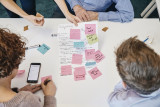
Te wicked? Niet voor ons.
Wij werken allemaal aan urgente, complexe, maatschappelijke uitdagingen. Issues die schier onoplosbaar lijken, van dilemma’s en paradoxen omgeven, nog niet duidelijk hoe het moet. Wel is duidelijk dát het moet, dat we elkaar nodig
hebben en dat we er NU aan moeten beginnen. Om met de woorden van Jan Rotmans te spreken; we leven niet in een tijdperk van verandering maar in een verandering van tijdperk. En hier hoort een nieuwe gereedschapskist bij.
En of je nou aan energietransitie werkt, andere mobiliteitssystemen, creëren van waterstofhubs, peer to peer autodeelsystemen, het maakt niet uit, we zien dat al deze opgaven op enig moment tegen gelijksoortige barrières aanlopen. Op samenwerking, financiering, privacy, onvoldoende aansluiting op de maatschappij, om maar een paar voorbeelden te noemen.
Unieke samenwerking
Als Amsterdam Smart City netwerk willen en kunnen we deze opgaven niet laten liggen. Door het bundelen van onze kennis en expertise kunnen we als netwerk iets unieks bieden en de wil en durf tonen om deze barrières te doorbreken. De betrokken partners die dit uitdenken en begeleiden zijn RHDHV, Kennisland, Drift, NEMO, Arcadis, Alliander, HvA en Metabolic. Zij bundelen hun expertise en ervaring om de echte vragen boven tafel te krijgen, tot nieuwe manieren van samenwerken te komen en barrières te doorbreken. We richten ons met name op de start van de samenwerking. Gezamenlijk ontwikkelen we een ‘wicked problem aanpak’. Op een nieuwe manier, lerend door te doen, exploratief.
Waar moet je aan denken?
Wat is eigenlijk het echte probleem? Wiens probleem is dit? Hoe kijken anderen er tegenaan? Welke andere partijen lijken nodig? Hoe vind je ze? Hoe ga je om met eigenaarschap en botsende frames? Hoe zorg je dat je al in
een vroeg stadium de maatschappij (bewoners, ondernemers, werknemers, etc) betrekt en hun ervaringen in het project trekt? Het wicked problem team zet nieuwe methoden in voor het beantwoorden van deze vragen. En het creëren van de benodigde commitment om het vraagstuk aan te pakken. Niets staat van te voren vast, want we passen ons aan aan wat we tegenkomen. Met elkaar ontwikkelen we een nieuwe aanpak om de barrières te doorbreken.
Transition from Smart to Inclusive city

The primary objective of this research project is to enhance an understanding of the concept of inclusion and its criteria in Smart city discourse. The research ambition is applying the result as a tool for benchmarking inclusive smart cities, which can assess and improve them. To apply the result, we aim to work with cities like Amsterdam, The Hauge, and Rotterdam.
EC-Link Platform

You would like to connect with Urban Environmental Sustainability practitioners and researchers in China and exchange your approaches to green transport, clean energy, compact urban development, water and solid waste management, green buildings and municipal finance? Then sign up to the EC-Link platform! The platform links Eco Cities across Europe and China, offering inspiring examples from both sides of Eurasia and enabling direct contacts to the innovators. With the help of an integrated translation tool, posts can be translated into Chinese and English with just one click. Use of the platform is free of charge: http://eclink.org/bbs/#/?lang=en
A description of how the platform works can be downloaded here: http://eclink.org/ec_platform/upload/document/EC-Link_Users'%20Guide-EN.pdf
Blue Force Tracking
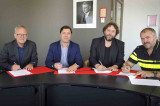
Testing medical certified body sensors to detect unexpected behaviour, triggering an alert, which allows the command & control room to act and better support their fellow officers in the field.
[►
Blue Force Tracking - Nalta Experience #1
How to improve the protection and safety of the Dutch Blue Force using smart Technology?
Nalta built a new innovative Internet of Things solution solving just that. In partnership with the Netherlands Police, the municipality of Amsterdam, Johan Cruijff Arena, Dell Technologies and Dell Boomi we cre
Nalta YouTube](https://www.youtube.com/watch?v=_cyFp_XGLFA)
5G-Blueprint

The 5G-Blueprint project is an international consortium of 28 parties. Together, these partners will be researching how real-time data exchange to and from vehicles, between terminals and vehicles, and between vehicles and distribution centers can contribute to increased efficiency in the supply chain, and help to resolve driver shortages by providing remote control of and support for vehicles and vessels. These developments are expected to improve accessibility of a key logistical corridor between the Netherlands and Belgium (Vlissingen – Ghent – Antwerp), as well as creating more jobs and strengthening the competitive position of the region. New 5G telecommunication technologies can be deployed as a useful resource in this area.
<https://eurofiber.com/press/eurofiber-partners-with-international-research-project-5g-blueprint/>
Stay up to date
Get notified about new updates, opportunities or events that match your interests.


